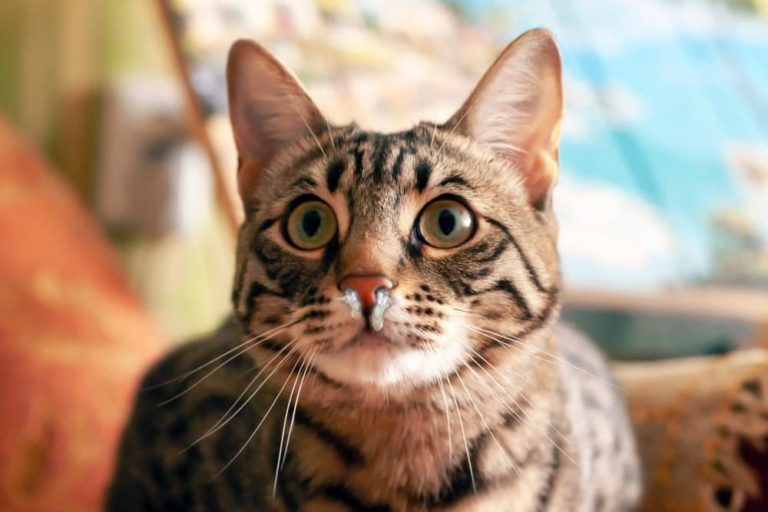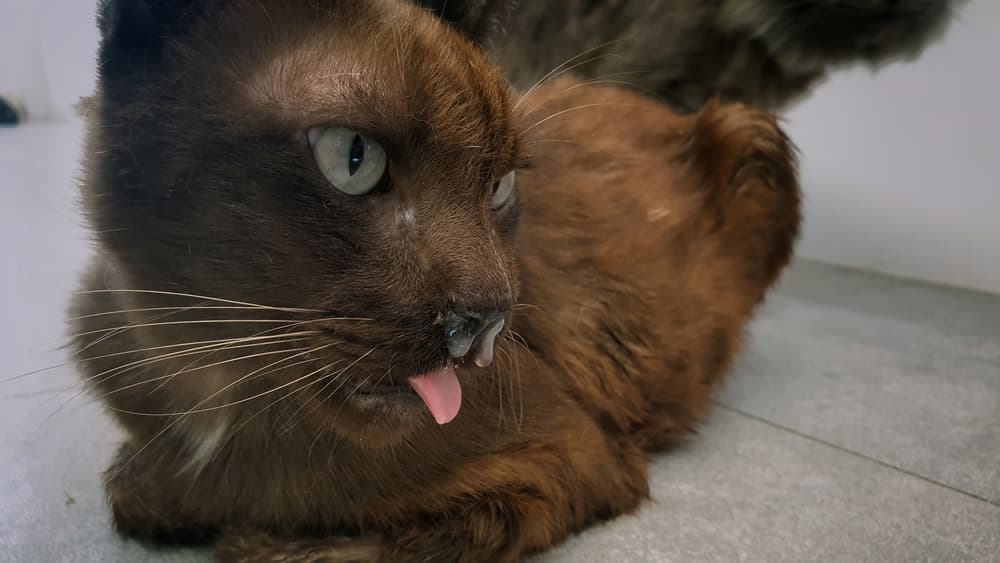Can Cats Get Kennel Cough?

Overview
Kennel cough, also known as Canine Infectious Respiratory Disease Complex (CIRDC), is a common medical issue in dogs. A variety of viruses and bacteria are involved. The biggest symptom is — you guessed it — coughing!
But can cats get kennel cough? If your dog is sick with kennel cough, is your cat going to get sick too? Let’s take a look.
Can Cats Get Kennel Cough?
The viruses involved in kennel cough are very specific to dogs in most cases, including canine distemper virus, canine parainfluenza virus, and canine adenovirus type 2. Veterinarians only use the term “kennel cough” for dogs.
However, one bacterium that is often involved in cases of kennel cough in dogs — Bordetella bronchiseptica, or Bordetella for short — can infect cats. So even though cats don’t catch dog viruses, cats can get infected with Bordetella if a dog is sick with kennel cough. In other words, cat’s don’t get kennel cough, but they can get sick and cough with Bordetella.
Since veterinarians don’t refer to this condition as kennel cough in cats, what follows is an overview of Bordetella in cats.
What Is Bordetella in Cats?

Bordetella is a bacterium that specifically sticks to the inner lining of the respiratory tract using fimbriae, or tiny fingerlike projections that reach out and grab onto specific cells. Bordetella sticks to the throat and trachea (windpipe) all the way to the bronchi (airways in the lungs).
Bordetella is a relatively common bacterium and can be found in healthy cats. Approximately 11 percent of healthy cats carry and shed the bacterium. However, in cats sick with respiratory symptoms, around 45 percent of cats have Bordetella.
Most cats do not show symptoms, and if they do, the cats will recover after mild to moderate symptoms. In young kittens, Bordetella can cause pneumonia, or infection and inflammation of the lower airways (such as bronchi). Pneumonia with Bordetella is much more serious as it can cause cats to struggle to breathe.
Bordetella is relatively common in household dogs and dogs in animal shelters. It can spread in grooming, doggy daycare or boarding facilities, whereas pet cats are rarely exposed to Bordetella. In dogs, a lot of coughing occurs but not so much in cats.
What Causes Bordetella in Cats?
Bordetella is caused by exposure to the bacterium by directly touching respiratory fluid, such as nose discharge or mucus that comes out while coughing. Cats can also catch Bordetella by touching items that have bacteria on it, such as food bowls or cat toys.
There are multiple risk factors for Bordetella — healthy low-stress cats in a home are unlikely to contract this disease. Young cats are more at risk of developing pneumonia due to their immature immune systems. Other risk factors include overcrowding, stress, infection with other viruses, and exposure to cats or dogs with the disease.
Cats can readily spread Bordetella to each other, and dogs can give Bordetella to cats. Cats can give it to dogs, but this is exceedingly rare. It is important to note that cats (and dogs) might be able to give the disease to humans. However, this has not been proven and, if true, it would be very rare.
Bordetella in Cats: Symptoms

Bordetella causes symptoms similar to other pathogens (i.e. viruses and bacteria) that cause upper respiratory disease, such as feline herpesvirus-1. It is almost impossible to tell them apart, and most cats with these symptoms have more than one pathogen anyway. The unique symptom for Bordetella is the cough—a loud, high-pitched cough often described as honking. However, cats cough less often than dogs, so this may not be present.
Other signs of Bordetella in cats include:
- Discharge from the nose
- Discharge from the eyes
- Nasal congestion (nose sounds stuffed up)
- Redness to the eyes
- Sneezing
- Retching (your kitty looks like he’s ready to vomit but instead small amount of thick yellow-green mucus comes out – different from vomiting as it does not require multiple movements from the belly)
- Fast breathing rate (if you count more than 40 breaths per minute)
- Trouble breathing (using the belly to breathe in a dramatic way)
- Decreased appetite
- Decreased activity
Diagnosing Bordetella in Cats

Veterinarians examine cats but may not test for the exact cause if a cat is showing disease in the upper airway, such as the nose and throat. No matter the cause, the treatment tends to be the same. Your veterinarian will need to listen to your cat’s chest very thoroughly and may recommend X-rays if they think the lungs could be involved. X-rays will look for signs of pneumonia.
If your veterinarian does recommend testing for Bordetella, this is done either with a wash into the respiratory system or with a blood test known as polymerase chain reaction (PCR).
A wash is performed by anesthetizing your cat (giving medications to your cat to make him sleep) and putting sterile saline into the lungs, then immediately sucking the fluid out.
PCR is a common blood test for many different pathogens; most laboratories have a specific PCR panel for all respiratory pathogens in cats and can detect the bacterium even in trace amounts. While PCR is easier to obtain and does not require anesthesia, it will provide a positive test result even if the only bacteria present are dead and not causing infection anymore.
Performing culture on samples that contain Bordetella is very useful to your veterinarian. Bordetella is notorious for being resistant to some common antibiotics, and culture will demonstrate what antibiotics will or won’t be effective against your cat’s exact Bordetella strain.
Bordetella in Cats: Treatment

Bacteria are treated with antibiotics. The most recommended antibiotic for Bordetella is doxycycline. However, antibiotics such as enrofloxacin are common and relatively effective as well. Bordetella is known for creating resistance to specific antibiotics, so a change in antibiotics may be needed if the first choice is not effective.
Some cats can heal from Bordetella without medical intervention at all. However, cats that are showing symptoms of Bordetella should be treated with antibiotics to ensure the disease does not progress into the lungs and cause difficulty breathing.
Other treatments depend on your cat’s unique symptoms. For nasal congestion or coughing, nebulizing is common. Alternatively, if a cat has a stuffy nose but is doing well otherwise, placing your cat into the bathroom and running hot water in the shower to create steam could help with the congestion. If appetite has decreased, pet parents should offer a variety of dry and canned cat foods, as well as cooked plain meat, canned tuna, and cat treats to stimulate appetite.
Cost of Treating Bordetella in Cats
If your cat experiences mild to moderate symptoms and no testing is performed, the cost of treatment and examination is likely around $150-$200. However, X-rays are often recommended and would increase costs to somewhere around $500-$800. If your cat is very ill or chronically ill and your veterinarian recommends more advanced testing such as a respiratory wash, the cost typically goes closer to $1,500-$2,000.
Preventing Bordetella in Cats
Your cat should avoid contact with cats and dogs of unknown health. There is a Bordetella vaccination, but it is only recommended in animal shelters or catteries in which Bordetella is proven to cause disease in multiple cats. The vaccine can cause mild disease itself and is not recommended for pet cats.
Related Conditions
Any pathogen causing respiratory infection in cats, such as:
- Feline herpesvirus-1
- Feline calicivirus
- Mycoplasma spp. (a different bacterium)
- Chlamydophila felis (a different bacterium)









